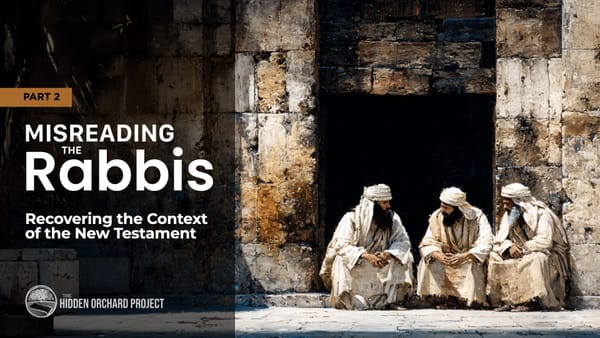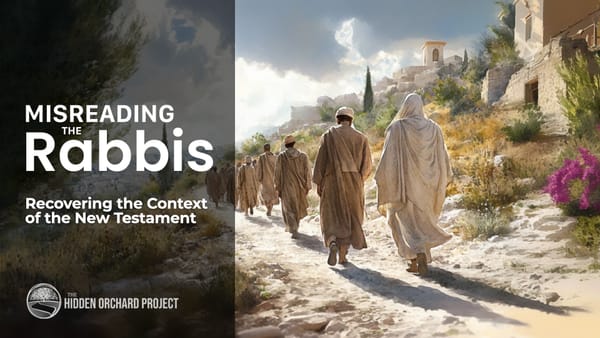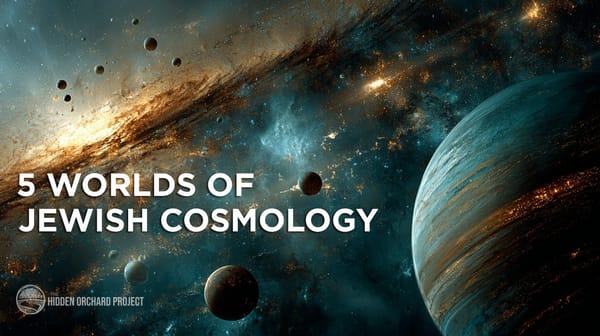Antisemitism in the New Testament?

Context matters. We hear this often, but seldom recognize the collateral damage of failing to get it right. Centuries of misunderstanding and decontextualized interpretations of the New Testament have fueled, (even endorsed) violence, hatred, and the loss of Jewish life. From the early church fathers to present day America, this problem persists.
On the other hand, what are we to make of passages like this?
You are of your father the devil, and your will is to do your father’s desires. - John 8:44
When a pastor, celebrity, or celebrity pastor reads from their English New Testament, they may be unwittingly forwarding a centuries-old bias that is not founded in truth. They may be well intentioned, but simply unaware, having not invested the time to explore beyond face-value.
When compounded with the usual knowledge gaps, we have a problem that will require humility, time, and much effort to unravel. Unable to cover them all, we will look at a few in this article.
"Jews"
We should begin by asking what the New Testament means by the word "Jew". As many do, projecting our modern conception backwards will prove to be disastrous.
The word often translated as "Jews", (ioudaios) actually carries a few different meanings;
• A descendant of the tribe of Judah
• Someone from the socio-religious party residing in Judea, aka Judeans
• A general term for someone from the nation of Israel
The nuance here is important as it can, in many cases, reflect the intra-Jewish rivalry between Galilean and Judean worldviews¹. Both groups were descendants of Jacob - part of the same family - yet with different customs. Before the days of codified Jewish law, these customs would become the arena for disputations and disagreements. It is interesting that the books of John and Acts reflect the most references to 'Jews", which we should first seek to understand against this backdrop.
It was not uncommon for Rabbis to speak harshly when engaged in debates. The Talmud records these examples, but also discourages such behavior.
Further inflaming this tension, the communities influenced by John incurred conflict by the Judeans, hence why many scholars believe the works of John to be innately antagonistic toward them. It is therefore not the case that John was advocating against all Jewish people as it was them of whom the early community was entirely comprised of.
"Sons of Satan"
In the first century, these disputations could often be the center of intellectual sparring between the different schools of Pharisees. The language is virtually the same as we see in the above passage in John.
Strengthening this understanding, in Acts 13, we see Paul visiting a "synagogue of the Judeans"(v.4) where he encounters Elymas, a magician, whom he calls a son of Satan (v. 10). Striking parallels can be found in the Talmud reflecting the opinion of one Pharisee against another, calling them a "son of Satan" ². We should recognize that these in no way should have been drawn to the anti-semitic views we see today.
Additionally, in much of Rabbinic literature, "Satan" can also be a metaphor for the ego, simply meaning that someone is arrogant or lacking in the proper balance of character traits, or corrupted in their understanding of [Torah] knowledge.
Satan, the evil inclination (the ego), and the Angel of Death are one, that is, they are three aspects of the same essence. - Talmud Bava Batra 16a
Martin Luther
The Gentile church began to separate from the Jewish communities in the early second century as a result of several social, religious, and political pressures - many of which were applied by the Roman Emperor as a means to separate these people groups³.
The Roman Catholic church began amid these biases, many of which have persisted. Even though Martin Luther is often perceived as the great reformer and liberator of Christian theology - his worldview and preferred [Catholic] commentaries were among his greatest influences - importing this bias into Protestantism.
On this, Luther scholar, Heiko Oberman states;
“The terrible tragedy of the relationship between Jews and Christians in world history can be studied in concentrated form in the history of this one man."
Luther, projecting the corruption of the Catholic leadership into the Gospels, painted the "Jews" as the enemies of the Gospel in his homilies. The ever-present European mistrust of all Jews would be further fanned into flames in his later years in his writings. Luther writes;
“I advise that their [Jews] houses be razed and destroyed,” he wrote, and “I advise that their Rabbis be forbidden to teach… on pain on life and limb.” - On The Jews and Their Lies. Martin Luther
It is easy to see why Adolph Hitler would call on the words of Martin Luther to rile German society up ahead of the events leading to the Holocaust.
Correcting the Mistakes
In our time, New Testament scholars have begun to overturn these translations⁴, adding fresh insight into deep-rooted problems. Like any new information, the lag time of acceptance will prove to be the obstacle to lasting change.
Will people humbly revisit these texts and re-evaluate their assumptions - or burrow deeper into their beliefs and embolden themselves with those who share similar views? Only time will tell.
Notes:
¹ "...In many aspects "behavior of the Galileans was in many respects on a higher level than that of the Judeans. The Galileans observed both the Torah and the teachings of the Sages. - Shmuel Safrai. "Jesus and the Hasadim".
² "He said to them: Did you hear that Dosa ben Harkinas issued this ruling, or did you hear that it was stated by ben Harkinas? They said to him: On your life, Rabbi, we heard simply ben Harkinas. He said to them: If so, it is no wonder, as I have a younger brother who is the firstborn of the Satan, (i.e., he is extremely sharp and as brazen as a demon). And his name is Yonatan, and he is among the disciples of Shammai. It is he who issued this ruling.” - Talmud Yevamot 16a
³ For instance, see "Fiscus Judaicus" https://www.jewishencyclopedia.com/articles/6157-fiscus-judaicus
⁴ Great article on the term "Jew" http://www.bible-researcher.com/burke1.html
For further study, Coursera offers the following online course; "Luther and the West." by Northwestern University.






